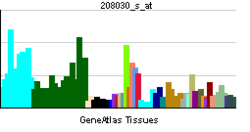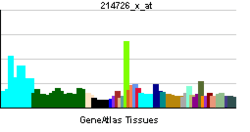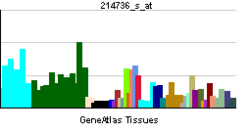ADD1
| View/Edit Human | View/Edit Mouse |
Alpha-adducin is a protein that in humans is encoded by the ADD1 gene.[3][4]
Adducins are a family of cytoskeleton proteins encoded by three genes (alpha, beta, gamma). Adducin is a heterodimeric protein that consists of related subunits, which are produced from distinct genes but share a similar structure. Alpha- and beta-adducin include a protease-resistant N-terminal region and a protease-sensitive, hydrophilic C-terminal region. Alpha- and gamma-adducins are ubiquitously expressed. In contrast, beta-adducin is expressed at high levels in brain and hematopoietic tissues. Adducin binds with high affinity to Ca(2+)/calmodulin and is a substrate for protein kinases A and C. Alternative splicing results in multiple variants encoding distinct isoforms; however, not all variants have been fully described. Polymorphism in ADD1 is associated with hypertension.[4]
References
- ↑ "Human PubMed Reference:".
- ↑ "Mouse PubMed Reference:".
- ↑ Joshi R, Gilligan DM, Otto E, McLaughlin T, Bennett V (Nov 1991). "Primary structure and domain organization of human alpha and beta adducin". J Cell Biol. 115 (3): 665–75. doi:10.1083/jcb.115.3.665. PMC 2289184
 . PMID 1840603.
. PMID 1840603. - 1 2 "Entrez Gene: ADD1 adducin 1 (alpha)".
External links
- Human ADD1 genome location and ADD1 gene details page in the UCSC Genome Browser.
Further reading
- Mangeat PH (1989). "Interaction of biological membranes with the cytoskeletal framework of living cells". Biol. Cell. 64 (3): 261–81. doi:10.1016/0248-4900(88)90001-9. PMID 2976282.
- Matsuoka Y, Li X, Bennett V (2000). "Adducin: structure, function and regulation". Cell. Mol. Life Sci. 57 (6): 884–95. doi:10.1007/PL00000731. PMID 10950304.
- Goldberg YP, Lin BY, Andrew SE, et al. (1993). "Cloning and mapping of the alpha-adducin gene close to D4S95 and assessment of its relationship to Huntington disease". Hum. Mol. Genet. 1 (9): 669–75. doi:10.1093/hmg/1.9.669. PMID 1284592.
- Taylor SA, Snell RG, Buckler A, et al. (1994). "Cloning of the alpha-adducin gene from the Huntington's disease candidate region of chromosome 4 by exon amplification". Nat. Genet. 2 (3): 223–7. doi:10.1038/ng1192-223. PMID 1345173.
- Gardner K, Bennett V (1987). "Modulation of spectrin-actin assembly by erythrocyte adducin". Nature. 328 (6128): 359–62. doi:10.1038/328359a0. PMID 3600811.
- Gilligan DM, Lieman J, Bennett V (1996). "Assignment of the human beta-adducin gene (ADD2) to 2p13-p14 by in situ hybridization". Genomics. 28 (3): 610–2. doi:10.1006/geno.1995.1205. PMID 7490111.
- Lin B, Nasir J, McDonald H, et al. (1995). "Genomic organization of the human alpha-adducin gene and its alternately spliced isoforms". Genomics. 25 (1): 93–9. doi:10.1016/0888-7543(95)80113-Z. PMID 7774961.
- Nasir J, Lin B, Bucan M, et al. (1994). "The murine homologues of the Huntington disease gene (Hdh) and the alpha-adducin gene (Add1) map to mouse chromosome 5 within a region of conserved synteny with human chromosome 4p16.3". Genomics. 22 (1): 198–201. doi:10.1006/geno.1994.1361. PMID 7959767.
- Kuhlman PA, Hughes CA, Bennett V, Fowler VM (1996). "A new function for adducin. Calcium/calmodulin-regulated capping of the barbed ends of actin filaments". J. Biol. Chem. 271 (14): 7986–91. doi:10.1074/jbc.271.14.7986. PMID 8626479.
- Li X, Bennett V (1996). "Identification of the spectrin subunit and domains required for formation of spectrin/adducin/actin complexes". J. Biol. Chem. 271 (26): 15695–702. doi:10.1074/jbc.271.26.15695. PMID 8663089.
- Matsuoka Y, Hughes CA, Bennett V (1996). "Adducin regulation. Definition of the calmodulin-binding domain and sites of phosphorylation by protein kinases A and C". J. Biol. Chem. 271 (41): 25157–66. doi:10.1074/jbc.271.41.25157. PMID 8810272.
- Hadano S, Ishida Y, Tomiyasu H, et al. (1997). "Transcript map of the human chromosome 4p16.3 consisting of 627 cDNA clones derived from 1 Mb of the Huntington's disease locus". DNA Res. 3 (4): 239–55. doi:10.1093/dnares/3.4.239. PMID 8946164.
- Cusi D, Barlassina C, Azzani T, et al. (1997). "Polymorphisms of alpha-adducin and salt sensitivity in patients with essential hypertension". Lancet. 349 (9062): 1353–7. doi:10.1016/S0140-6736(97)01029-5. PMID 9149697.
- Kamitani A, Wong ZY, Fraser R, et al. (1998). "Human alpha-adducin gene, blood pressure, and sodium metabolism". Hypertension. 32 (1): 138–43. doi:10.1161/01.HYP.32.1.138. PMID 9674650.
- Matsuoka Y, Li X, Bennett V (1998). "Adducin is an in vivo substrate for protein kinase C: phosphorylation in the MARCKS-related domain inhibits activity in promoting spectrin-actin complexes and occurs in many cells, including dendritic spines of neurons". J. Cell Biol. 142 (2): 485–97. doi:10.1083/jcb.142.2.485. PMC 2133059
 . PMID 9679146.
. PMID 9679146. - Fukata Y, Oshiro N, Kinoshita N, et al. (1999). "Phosphorylation of adducin by Rho-kinase plays a crucial role in cell motility". J. Cell Biol. 145 (2): 347–61. doi:10.1083/jcb.145.2.347. PMC 2133101
 . PMID 10209029.
. PMID 10209029. - Halushka MK, Fan JB, Bentley K, et al. (1999). "Patterns of single-nucleotide polymorphisms in candidate genes for blood-pressure homeostasis". Nat. Genet. 22 (3): 239–47. doi:10.1038/10297. PMID 10391210.
- Ferrandi M, Salardi S, Tripodi G, et al. (1999). "Evidence for an interaction between adducin and Na(+)-K(+)-ATPase: relation to genetic hypertension". Am. J. Physiol. 277 (4 Pt 2): H1338–49. PMID 10516168.


